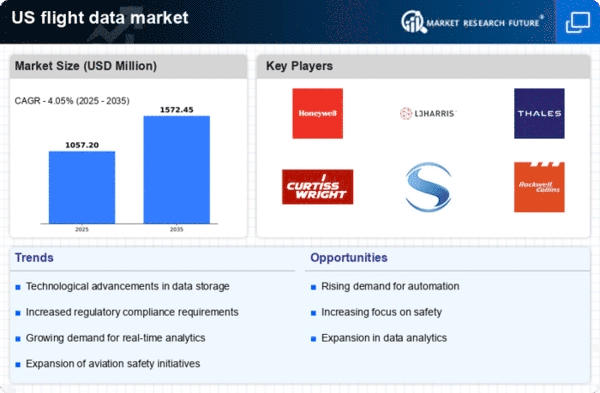Growing Demand for Data Analytics
The flight data-recorder market is experiencing a notable surge in demand for advanced data analytics capabilities. Airlines and aviation authorities are increasingly recognizing the value of data collected from flight data recorders for enhancing operational efficiency and safety. The integration of sophisticated analytics tools allows for real-time monitoring and predictive maintenance, which can potentially reduce operational costs by up to 15%. This trend is likely to drive investments in flight data recorders equipped with enhanced data processing capabilities, thereby expanding the market. Furthermore, as the aviation industry continues to evolve, the need for actionable insights derived from flight data is expected to grow, further propelling the flight data-recorder market.
Rising Regulatory Compliance Requirements
The flight data-recorder market is significantly impacted by the rising regulatory compliance requirements imposed by aviation authorities. In the United States, the FAA has established stringent guidelines for data recording and retrieval, necessitating the adoption of advanced flight data recorders. Compliance with these regulations is essential for airlines to ensure operational safety and avoid penalties. As a result, the market is likely to experience increased demand for flight data recorders that meet or exceed these regulatory standards. This trend may lead to a market growth of approximately 6% as airlines prioritize compliance and invest in modern recording technologies.
Emerging Focus on Environmental Sustainability
The flight data-recorder market is increasingly influenced by the aviation industry's commitment to environmental sustainability. Airlines are under pressure to reduce their carbon footprint, and flight data recorders play a crucial role in monitoring fuel efficiency and emissions. By analyzing data from these devices, airlines can implement strategies to optimize flight paths and reduce fuel consumption, potentially leading to a 10% decrease in emissions. This growing emphasis on sustainability is likely to drive innovation in the flight data-recorder market, as manufacturers develop eco-friendly solutions that align with regulatory requirements and consumer expectations.
Increased Investment in Aviation Infrastructure
The flight data-recorder market is poised to benefit from the substantial investments being made in aviation infrastructure across the United States. With the Federal Aviation Administration (FAA) allocating billions of dollars for modernization projects, there is a corresponding need for upgraded flight data recorders that comply with new standards. This investment is anticipated to enhance the safety and reliability of air travel, thereby increasing the demand for advanced flight data recorders. As airlines and operators upgrade their fleets, the flight data-recorder market is likely to see a significant boost, with projections indicating a growth rate of approximately 8% annually over the next five years.
Technological Integration with Next-Gen Aircraft
The flight data-recorder market is witnessing a transformation due to the integration of advanced technologies in next-generation aircraft. Modern aircraft are increasingly equipped with sophisticated avionics systems that require compatible flight data recorders. This integration not only enhances data collection capabilities but also improves the overall safety and performance of flights. As airlines invest in new aircraft, the demand for state-of-the-art flight data recorders is expected to rise. The market could see a compound annual growth rate (CAGR) of around 7% as manufacturers adapt to these technological advancements and meet the evolving needs of the aviation sector.

















